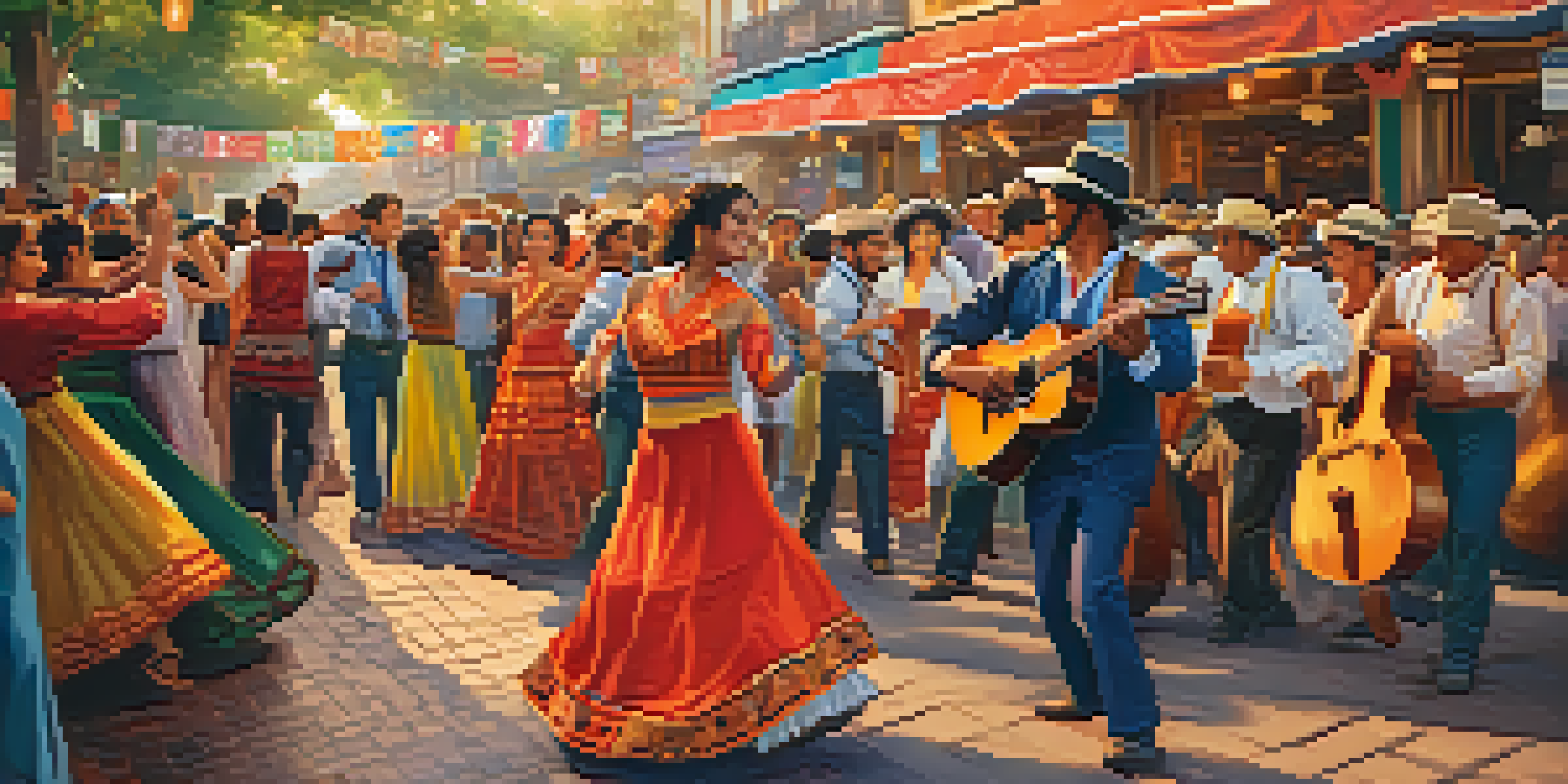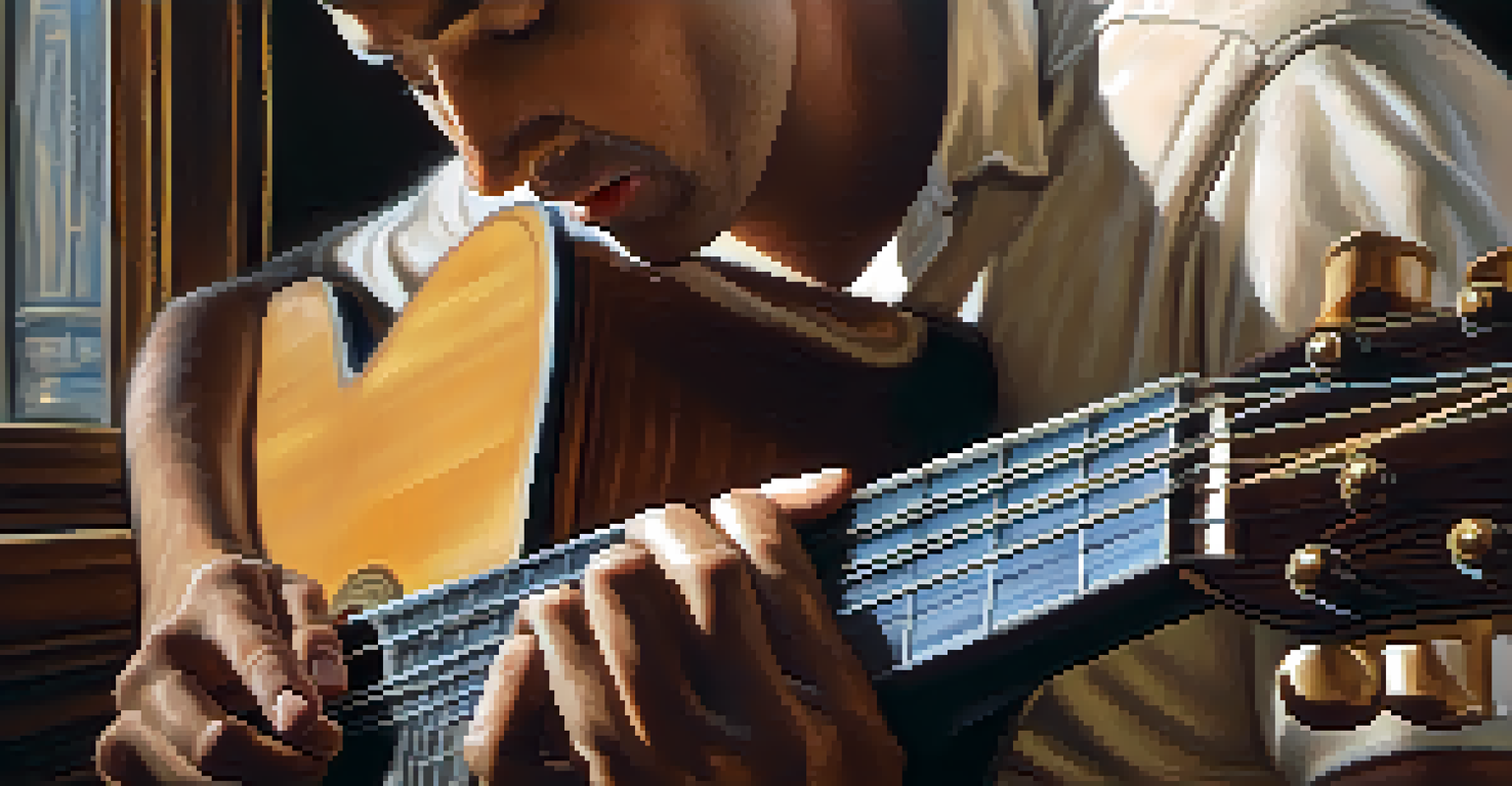The Intersection of Guitar Music and Cultural Heritage

How Guitar Music Reflects Cultural Identity
Guitar music serves as a powerful expression of cultural identity, reflecting the stories and traditions of communities. In many cultures, the guitar has become a symbol of heritage, linking generations through shared musical experiences. For instance, Flamenco guitar in Spain not only showcases technical prowess but also tells tales of history and passion.
Music can change the world because it can change people.
As people gather to celebrate, the guitar often becomes the centerpiece of social interactions, allowing individuals to connect through rhythm and melody. This communal aspect of music fosters a sense of belonging and pride in one’s cultural roots. From the streets of Buenos Aires to the hills of Appalachia, guitar music breathes life into the stories of diverse communities.
Moreover, guitar styles often evolve, influenced by the cultural landscapes they inhabit. This ongoing dialogue between tradition and innovation keeps the music vibrant and relevant, ensuring that cultural heritage is not only preserved but also celebrated.
Guitar Techniques Rooted in Cultural Traditions
Different cultures have developed unique guitar techniques that highlight their distinct sounds and styles. For example, the fingerpicking style found in American blues draws from African musical traditions, showcasing a rich blend of influences. This technique not only emphasizes the personal expression of the musician but also connects listeners to the cultural narratives behind the music.

In contrast, the strumming patterns in Brazilian bossa nova evoke the rhythms of samba, illustrating how guitar techniques can reflect broader cultural movements. Each strum and pluck carries echoes of history, community, and shared experiences, inviting listeners to engage with the music on a deeper level. The guitar thus becomes a bridge between the past and present.
Guitar Music Reflects Cultural Identity
Guitar music serves as a profound expression of cultural identity, linking communities through shared traditions and stories.
These techniques also serve as a means of preserving cultural heritage, as musicians pass them down through generations. As young guitarists learn these methods, they embrace their cultural identity while also contributing to the evolution of the music.
The Role of Guitar Music in Cultural Celebrations
Cultural celebrations often feature guitar music as a highlight, enhancing the festive atmosphere. From weddings to festivals, the guitar brings people together, creating a shared experience that strengthens community bonds. For example, during a Mexican fiesta, the sound of mariachi guitars fills the air, inviting everyone to dance and celebrate.
The guitar is a miniature orchestra in itself.
These gatherings not only showcase the musical talent within the community but also serve as a reminder of cultural pride and unity. The communal aspect of playing the guitar fosters connections, as friends and families join in song, reinforcing their shared heritage. This collective participation transforms ordinary moments into lasting memories.
Furthermore, guitar music in celebrations can also be a form of cultural resistance. By embracing traditional songs and rhythms, communities assert their identity, challenging dominant narratives and honoring their roots.
The Impact of Guitar Music on Global Culture
Guitar music has transcended geographical boundaries, influencing global culture in profound ways. With the advent of technology and the internet, unique styles from different regions can be shared and appreciated worldwide. This cross-pollination of musical ideas enriches the global music scene, allowing diverse voices to be heard.
Artists like Carlos Santana and Jimi Hendrix have drawn from their cultural backgrounds to create revolutionary sounds that resonate with audiences globally. Their innovative guitar playing not only showcases technical skill but also incorporates elements from their cultural heritage, making their music relatable to a broad audience.
Techniques Preserve Cultural Heritage
Unique guitar techniques rooted in different cultures not only showcase distinct musical styles but also play a vital role in preserving cultural heritage.
As guitar music continues to evolve, it serves as a reminder of our interconnectedness, illustrating that while we may come from different backgrounds, music has the power to unite us. This dynamic exchange fosters appreciation and respect for various cultural traditions, enriching the global tapestry of music.
Preserving Cultural Heritage Through Guitar Music
As we navigate a rapidly changing world, preserving cultural heritage through guitar music becomes increasingly important. Many musicians dedicate themselves to keeping traditional styles alive, using their craft to educate others about their cultural roots. This preservation efforts ensure that future generations can appreciate the rich histories tied to these musical forms.
Organizations and community programs also play a vital role in passing down traditional guitar techniques and songs. Workshops and classes offer opportunities for young musicians to learn from seasoned players, fostering a sense of pride in their cultural heritage. By engaging in these practices, communities actively resist cultural homogenization.
Moreover, the rise of social media platforms allows these traditional forms of guitar music to reach global audiences. Musicians can share their heritage with the world, inviting others to appreciate and respect their cultural backgrounds, thus creating a ripple effect of cultural appreciation.
Guitar Music as a Tool for Cultural Dialogue
Guitar music serves as an effective tool for cultural dialogue, allowing musicians from different backgrounds to collaborate and learn from one another. These artistic exchanges can break down barriers, fostering mutual respect and understanding. When guitarists from diverse cultures come together, they create a unique fusion that highlights the beauty of their differences.
For instance, genres like world music often blend traditional guitar styles from various cultures, resulting in innovative sounds that resonate with audiences everywhere. This collaboration not only enriches the music but also promotes cultural awareness and appreciation. Through these artistic partnerships, musicians can tell powerful stories that transcend language and geographical boundaries.
Global Impact of Guitar Music
Guitar music transcends borders, influencing global culture and fostering appreciation for diverse musical traditions through collaboration.
Furthermore, these collaborative efforts can spark conversations about cultural identity and heritage, encouraging listeners to reflect on their own backgrounds. By appreciating the intricate tapestry of guitar music, we can embrace our shared humanity while celebrating our unique cultural narratives.
The Future of Guitar Music and Cultural Heritage
As we look to the future, the intersection of guitar music and cultural heritage will undoubtedly continue to evolve. Emerging technologies, such as virtual reality and augmented reality, may offer innovative ways to experience guitar music, allowing audiences to engage with different cultures more deeply. These advancements could breathe new life into traditional forms, making them accessible to a wider audience.
Moreover, the younger generation of musicians is increasingly blending traditional guitar styles with contemporary genres, such as pop and hip-hop. This fusion not only keeps the music fresh and relevant but also ensures that cultural heritage remains a dynamic part of modern life. As these artists push boundaries, they honor their roots while paving the way for new expressions.

Ultimately, the future of guitar music lies in the balance between preservation and innovation. By embracing both aspects, we can ensure that the rich tapestry of cultural heritage continues to inspire and connect people for generations to come.